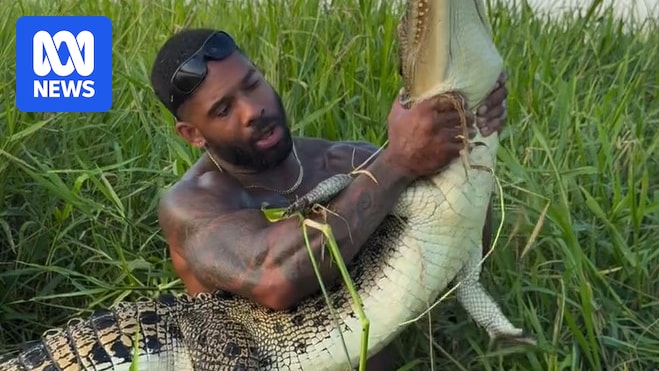There are calls for social media influencers who inappropriately handle Australian wildlife to be deported after footage of a man chasing and handling two crocodiles in Far North Queensland went viral.
Videos uploaded to Mike Holston’s social media accounts over the past four days showed the US influencer catching freshwater and saltwater crocodiles on Cape York.
One video has recorded more than 32 million views on Instagram.
People for the Ethical Treatment of Animals (PETA) called for Mr Holston to be punished, deported and banned from returning to Australia.
Mark Holston could be liable for thousands of dollars in fines from authorities. (Instagram: Mark Holston)
“Aside from it being illegal and unfathomably stupid to interfere with a crocodile in Queensland, it’s also incredibly cruel,” PETA advisor Mimi Bekhechi said.
“Just like wombats, koalas and other native Australian wildlife, crocodiles are sensitive individuals who experience pain and stress, and who deserve to live in peace without fear that visiting influencers will tackle and roughly handle them.”
A Queensland Department of the Environment, Tourism, Science and Innovation (DETSI) spokesperson said the department was “actively investigating” the videos.
“These actions are extremely dangerous and illegal, and we are actively exploring strong compliance action including fines to deter any person from this type of behaviour,” the spokesperson said.
David Crisafulli says it is not possible to regulate against “idiot” behaviour. (ABC News: Christopher Testa)
Mr Holston and the Immigration Department have been contacted for comment.
Premier: ‘He’s a goose’
Queensland Premier David Crisafulli called the influencer a “goose” and said while the state environment department would look into the matter, immigration was a matter for the federal government.
“If you think that is a sustainable business model to go wrestling with saltwater crocodiles, I think it’s probably not going to end the way that he thinks it’s going to,” Mr Crisafulli said.
Earlier this year, American Sam Jones apologised after footage showed her removing a baby wombat from its mother, and in 2023, Jaylie Tori was widely criticised after feeding a chicken to a crocodile near Babinda.
Mr Crisafulli said such influencers would eventually “meet their maker” in the course of their work.
“There’s a reason it’s called wildlife. It’s wild,” he said.
Jesse Crampton wishes influencers would use their powers for good. (Supplied: Jesse Crampton)
“Anyone stupid enough to do that shouldn’t be lauded and shouldn’t be praised — they should be called out for being an idiot.”
Fines unlikely to deter bad behaviour
Mr Holston could be liable for a fine upwards of $8,000 for interfering with a saltwater crocodile, or $37,500 if prosecuted successfully in the courts.
The maximum penalty for interfering with a freshwater crocodile is $27,539.
But crocodile farmer Jesse Crampton from Babinda, south of Cairns, said fines were unlikely to deter a popular influencer.
“Even if he’s gotten that fine, he’s already achieved his goal of getting people to watch his video,” he said.
“It’s still worth it for him.”
Sam Cornell is concerned about increasing influencer risky behaviour. (Supplied: Samuel Cornell)
Mr Crampton said the resilient crocs would have likely recovered from the initial stress of the “appalling” handling.
He supported PETA’s calls for deportation.
“He’s got such a unique opportunity to educate the globe about wildlife in the right sort of manner, but he’s unfortunately doing it a bit cowboyish,” he said.
Mr Crampton, who trains rangers to handle crocodiles, said he was also worried about a “growing trend with international social media influencers coming over here doing these outrageous activities to get clicks”.
University of New South Wales PhD candidate Sam Cornell said risky influencing was a growing industry.
Mr Cornell, whose research looks at how social media influences and promotes risky behaviours, said it could create copycat behaviour.
“It’s not just people putting themselves at risk in risky locations, we’re also seeing people playing with wildlife really inappropriately,” he said.
Worldwide crocodile attack database CrocAttack has recorded 46 fatal attacks in Australia since 1969.

